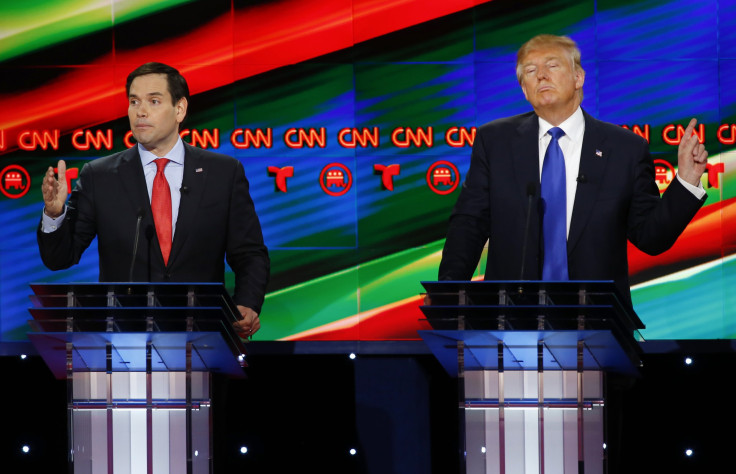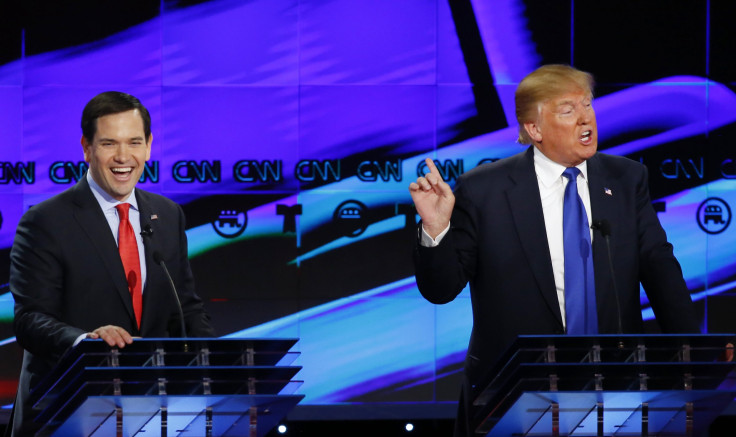Who Won The 10th Republican Debate? Rubio, Trump, Cruz, Kasich And Carson Spar In Texas In CNN Telemundo Event

Still looking for a moment in the campaign that will propel him toward victory in the 2016 Republican primary, Florida Sen. Marco Rubio seemed to have a debate performance in Houston worthy of the cause, evoking lengthy applause and earning praise on Twitter for his aggressive attacks on front-runner businessman Donald Trump. The only thing is, Trump didn’t have a performance that would alienate any of his base and neither did Texas Sen. Ted Cruz — so will it matter?
The presidential candidates engaged in a lengthy discussion on issues from immigration reform to their personal taxes and Obamacare. Rubio, for one of the first times, joined Cruz in attacking the billionaire who has so far seemingly enjoyed what can only be described as political Teflon, with attacks sliding off him almost as quickly as they come. Good debate performances for candidates who attack Trump haven’t so far damaged that armor, though, so it’s unclear if this debate will prove to be any different.

But Rubio wasn’t the only candidate with a good performance Thursday night. Ohio Gov. John Kasich doubled down on his calm and confident tone that served him well in the New Hampshire primaries, when he finished in second place. He avoided getting in fights and squabbles with his GOP opponents and instead detailed fairly complex policy proposals and plans and maintained a decent amount of stage time. With former Florida Gov. Jeb Bush having dropped out of the race Saturday, Kasich may pose the greatest competition to Rubio as they look to attract Bush's so-called "establishment" supporters.
Those four were joined onstage by retired neurosurgeon Ben Carson, who, just like in many of the most recent debates, spoke very little.
This is Rubio's best night against Trump, but it's not even Trump's worst debate. Interested to see what the impact is.
— Nick Confessore (@nickconfessore) February 26, 2016
Donde esta Ben Carson?
— Ana Navarro (@ananavarro) February 26, 2016
During a back-and-forth with Trump, Rubio hit the businessman for seeming to repeat himself. Trump tried to return the favor and noted a recent debate in New Hampshire, when New Jersey Gov. Chris Christie criticized Rubio for repeating what he said was a memorized speech. If the Christie attack was effective, Trump’s effort to emulate it backfired. Rubio drew loud applause from the audience when he said that Trump was the one repeating things -- and beamed as the sound rushed over him and drowned out Trump’s frustrated protests.
Earlier in the debate Rubio repeatedly noted that Trump — who has relied on tough anti-immigrant rhetoric during his campaign — was once fined for hiring undocumented immigrants from Poland while building his famed Trump Tower in New York City. If Rubio was being repetitive throughout the debate, it was not noted by his opponents -- or the crowd.
Who's the liar? Rubio gets the last word. Watch #GOPdebate live: https://t.co/xRsP634FFghttps://t.co/baH0fpRsGr
— CNN Breaking News (@cnnbrk) February 26, 2016
.@realDonaldTrump and @marcorubio started the #GOPdebate with a major fight over immigrationhttps://t.co/4vEQGXpYb6
— Vox (@voxdotcom) February 26, 2016
.@realDonaldTrump's response to the fmr. Mexican president, "The wall just got 10-feet taller." #GOPDebate https://t.co/MvQiPqZkL9
— CNN (@CNN) February 26, 2016
Still, Trump and Cruz had fine debate performances. Trump was, by far, the most talked-about candidate on Twitter about 90 minutes into the debate. At that time, he was a part of 51 percent of the Twitter conversations using the “#GOPDebate” hashtag. He was followed by Rubio with 23 percent and then Cruz with 14 percent. Carson got 7 percent and Kasich got 5 percent.
What was once a race that included 17 Republicans vying for the party’s nomination has now been pared down to just five, with many considering the race more of a three-man competition.
The stakes are huge for the Republican Party and its identity going forward: Should Trump’s momentum after winning three of the first four states to cast votes continue, the party could have a de facto leader in 2016 who is abhorred, reportedly, by the party's establishment. For the moment, it appears that that establishment is mostly trying to rally around Rubio, who still faces a challenge from Kasich.
© Copyright IBTimes 2024. All rights reserved.






















